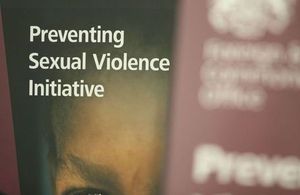UK experts from Preventing Sexual Violence Initiative deployed to Bosnia and Herzegovina
The PSVI experts work with judges and prosecutors in Bosnia and Herzegovina on learning about investigating, prosecuting and adjudicating wartime sexual violence crimes, questioning victims, witness protection and other special measures for supporting survivors.

Preventing Sexual Violence Initiative
As part of the Foreign Secretary’s Preventing Sexual Violence Initiative (PSVI), and in collaboration with the Organisation for Security and Cooperation (OSCE) and the Judicial and Prosecutorial Training Centre, two British experts are currently in Bosnia and Herzegovina delivering training to judges and prosecutors on conflict related sexual violence.
Tens of thousands of women and men were subjected to rape and other forms of sexual violence during the 1992-1995 armed conflict in Bosnia and Herzegovina, but the number of perpetrators held accountable for these crimes is appallingly low.
The training combines both legal and psychosocial perspectives to train judges and prosecutors in Bosnia and Herzegovina on the legal framework for prosecuting such crimes. Richard Rogers, PSVI legal expert, says:
Crimes of wartime sexual violence are notoriously difficult to prosecute. Prosecutors and judges face serious legal, evidential and psychosocial challenges. Our aim is to outline the national and international best practice that will help judicial actors deal with these complexities in a fair and efficient manner.
The training will cover difficulties inherent in investigating, prosecuting and adjudicating wartime sexual violence crimes, including techniques for questioning victims, as well as witness protection and other special measures for supporting survivors of sexual violence. The deployment works towards combating impunity for wartime sexual violence crimes and delivering justice to survivors, whilst embedding a training on wartime sexual violence offences in the training curriculum for judges and prosecutors.
Sanja Guzina, Banja Luka District Prosecutor, said:
In my work on war crime cases, I was faced with a problem of evidencing war crimes with sexual violence elements. Although all war crime cases are difficult and sensitive, sexual violence ones are particularly difficult for the deeply traumatised victim who unwillingly has to revive her experience. I believe it is crucial for each prosecutor to learn how to approach the victim and this is why I find this training very useful.
The wider Preventing Sexual Violence Initiative was launched by the Foreign Secretary in May 2012. This global initiative aims to replace the culture of impunity for sexual violence committed in conflict with one of deterrence - by increasing the number of perpetrators brought to justice both in international and national courts; by strengthening international efforts and co-ordination to prevent and respond to sexual violence; and by supporting states to build their national capacity.
Nigel Casey, British Ambassador to Bosnia and Herzegovina, said:
This is the second deployment of the UK Team of Experts to Bosnia and Herzegovina since the launch of this initiative. This autumn at the UN General Assembly, over 100 states agreed that it is time for a major international effort to prevent all forms of sexual violence in conflict and to shatter the culture of impunity for those who commit these crimes. The UK is leading a high-level political campaign supported by a range of practical measures, such as the development of an International Protocol on the Documentation and Investigation of Sexual Violence in Conflict, financial support to the UN and other organisations, and sustained country engagement, including these deployments of the UK Team of Experts to affected states.